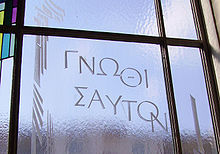Burton Rascoe
American writer (1892-1957)
Arthur Burton Rascoe (22 October 1892 – 19 March 1957) was an American journalist, editor and literary critic. His most famous work, Titans of Literature, appeared in 1932.


Quotes
edit- When H. L. Mencken unpacks his idiomatic brasses, tunes up his verbal strings, and gets in readiness his phrasal wood winds to orchestrate a fugue in damnation or in praise of man, god or book, his all too meagre audience cancels all other engagements to be on hand at the initial presentation. The result, that audience knows, will be an experience of pure enjoyment. His musicianship is unfailing. His program is unsatisfactory only in its impermanence. Though the theme he proposes is invariably Mencken — Mencken apropos of this or that — he gives it infinite and intricate variations.
- "Fanfare", in H. L. Mencken (1920)
- American literature has been, and is, singularly deficient in established critics who have anything like a rational conception of their jobs. The majority, initiate in a few of the patent rituals of Aristotle and Quintilian, don the forbidding robes of high priests to Sweetness and Light, and go about their business much as if the idea were to keep all they know to themselves.
- "Fanfare", in H. L. Mencken (1920)
- I felt exactly like the man in the advertisement who has not devoted fifteen minutes a day to the study of the classics. If only (I thought) I had devoted fifteen minutes a day to the cultivation of the aesthetic attitude! I could bound Afghanistan.
- "Contemporary Reminiscences" in Arts & Decoration, Vol. 26 (1927), p. 50
- It is true, of course, that like the fruit of the tree of life, Mr. Cabell's artistic progeny sprang from a first conceptual germ — "In the beginning was the Word." That animating idea is the assumption that if life may be said to have an aim it must be an aim to terminate in success and splendor. It postulates the high, fine importance of excess, the choice or discovery of an overwhelming impulse in life and a conscientious dedication to its fullest realization. It is the quality and intensity of the dream only which raises men above the biological norm; and it is fidelity to the dream which differentiates the exceptional figure, the man of heroic stature, from the muddling, aimless mediocrities about him. What the dream is, matters not at all — it may be a dream of sainthood, kingship, love, art, asceticism or sensual pleasure — so long as it is fully expressed with all the resources of self. It is this sort of completion which Mr. Cabell has elected to depict in all his work: the complete sensualist in Demetrios, the complete phrase-maker in Felix Kennaston, the complete poet in Marlowe, the complete lover in Perion. In each he has shown that this complete self-expression is achieved at the expense of all other possible selves, and that herein lies the tragedy of the ideal. Perfection is a costly flower and is cultured only by an uncompromising, strict husbandry.
- Introduction to Chivalry (1921) by James Branch Cabell, later published in Prometheans : Ancient and Modern (1933), p. 279
- Once we understand the fundamentals of Mr. Cabell's artistic aims, it is not easy to escape the fact that in Figures of Earth he undertook the staggering and almost unsuspected task of rewriting humanity's sacred books, just as in Jurgen he gave us a stupendous analogue of the ceaseless quest for beauty. For we must accept the truth that Mr. Cabell is not a novelist at all in the common acceptance of the term, but a historian of the human soul. His books are neither documentary nor representational; his characters are symbols of human desires and motives. By the not at all simple process of recording faithfully the projections of his rich and varied imagination, he has written thirteen books, which he accurately terms biography, wherein is the bitter-sweet truth about human life.
- Introduction to Chivalry (1921) by James Branch Cabell, later published in Prometheans : Ancient and Modern (1933), p. 279
- A news sense is really a sense of what is important, what is vital, what has color and life — what people are interested in. That's journalism.
- As quoted in Useful Quotations : A Cyclopedia of Quotations (1933) edited by Tryon Edwards, C. N. Catrevas, and Jonathan Edwards
- What no wife of a writer can ever understand, no matter if she lives with him for twenty years, is that a writer is working when he's staring out the window.
- Quoted by Bennett Cerf in Shake Well Before Using (1948)
- I am so constituted that I had rather read bad stuff than nothing.
- As quoted in the dedication to The Pumpkin Coach (1935) by Louis Paul